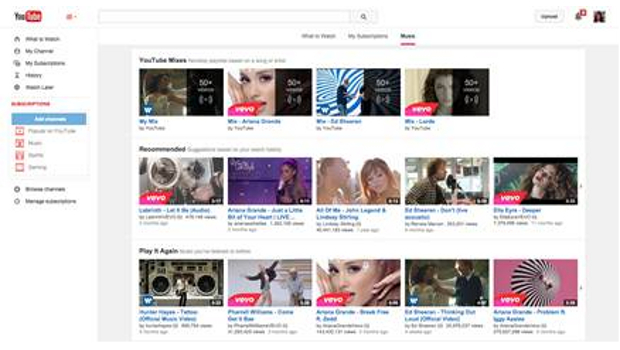 YouTube has a history of copyright tussles with record labels dating right back to one of its first viral hits. You may remember the 30-second clip of a toddler dancing to Prince’s Let’s go Crazy in 2007 that led to a legal battle between Universal Records and a suburban mother that’s going all the way to trial.
YouTube has a history of copyright tussles with record labels dating right back to one of its first viral hits. You may remember the 30-second clip of a toddler dancing to Prince’s Let’s go Crazy in 2007 that led to a legal battle between Universal Records and a suburban mother that’s going all the way to trial.
As this action was progressing YouTube has avoided similar cases by agreeing to take down material on request, attaching links to purchase music featured in clips and offering to mute clips using songs by Universal artists after royalty negotiations broke down in 2009.
YouTube is now the most-used music discovery service on the planet – this generation’s MTV only without a rotation policy… and actual music. It’s essential for every band and record label to have a presence but its massive catalogue hasn’t been treated as a source of revenue. At a time when streaming services are usurping downloads and the concept of music ownership comes under threat, YouTube had to start treating its content as an asset people would be willing to pay to access.
If you’ve logged on to YouTube in the last few days you’ll have noticed a category for music on the top menu beside the what to watch and subscription menus (presented as a tab in the mobile app). Clicking on this takes you to a page of playlists either based on artists you have listened to recently or curated around themes and moods with quirky titles (eg Soul After Midnight, Ultimate Party Songs, Crying on my Keyboards). This focused approach is only the first part of YouTube’s strategy, the second being Music Key – currently in beta and accessible in Ireland as part of a limited trial.
Music Key’s features will be familiar to users of streaming sites like Deezer and Spotify. The service uses a freemium revenue model with a free version supported by advertising and a feature-rich subscription version without. For €9.99 a month you can get access not only to the full catalogue but get offline playback and background listening for mobile users so you can listen without being stuck inside the app.
Alternate view
Having discussed Music Key on the TechRadio podcast with my co-host Dusty Rhodes I’m reasonably confident Music Key will hold its own without being a huge success for two reasons: First, it YouTube is already a better deal for artists. I don’t know what artists will be paid on a per-stream or basis but it would have to be a significant improvement on its current agreement. According to figures published on website thetrichordist.com, Spotify pays artists $5,210 per million streams compared with only $1,750 for YouTube. This is an awful deal for artists but YouTube is an accidental player in music with 1 billion monthly users. It’s an accidental giant and a channel you can’t afford boycott.
Spotify, however, has no such comfortable relationship with artists and labels. Taylor Swift, to take a recent example, has decided to take her entire back catalogue off Spotify owing to the poor royalty rate she was being paid. According to Swift’s record label, the songstress received a paltry $500,000 from the service. Spotify CEO Daniel Ek countered by saying Swift had earned $2 million from the global streaming market (the figure quoted by the label only covered the US) and that at her current rate of growth the singer was on track to make $6 million this year.
Swift’s people come from the industry mainstream but independent artists have also pulled their catalogues from Spotify such as Radiohead and Justin Moore, while the Beatles and AC/DC never used it at all. Adele, Coldplay and Beyonce managed a windowing period to allow sales of their albums to mature before releasing them as streams. This is a practice you would expect to extend to YouTube.
Unlike my co-host, I’m bullish on Music Key’s prospects. It has a massive audience and buy-in from the industry. Users will enjoy the same benefits as other services and it’s arguable that YouTube doesn’t even have to make money off it, just have enough to block any other players coming into the market.
Now I wonder what Apple is going to do with Beats in response. At this rate it had better be good. Music Key will be available in Ireland over the next few weeks on a six-month trial price of €7.99 for the premium version.







Subscribers 0
Fans 0
Followers 0
Followers